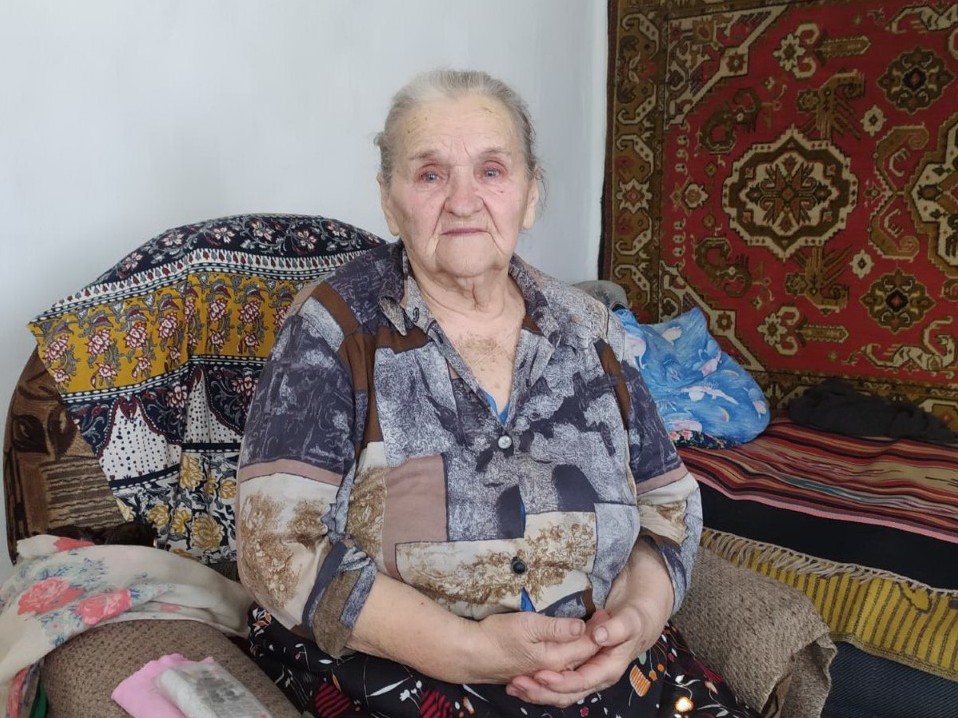
Klavdiya Kazakova, 80, lives in the conflict area in Eastern Ukraine. © HelpAge International
As conflict in Ukraine becomes more and more likely, and the media coverage and analysis ramp up, the narrative and reporting are missing one of the most important dimensions of any armed combat: the impact this will have on the people of Ukraine.
The country and its people are seemingly being cast as a pawn in a global game of chess. Everything is about US and Russia, Europe and Russia, NATO and Russia, while the Ukrainian government does not seem to feature directly in the negotiations, once again airbrushed from proceedings by Russia.
The fact that there is already an on-going humanitarian crisis in Ukraine which dates back to the 2014 invasion of Russian-backed forces is constantly missing from the narrative. Further conflict will devastate millions of people who are already struggling to get by.
According to a December 2021 snapshot of Ukraine by OCHA, 2.9 million people in the east of the country need humanitarian assistance. The creation of the 420 km ‘contact line’ which split two regions from the rest of Ukraine eight years ago has created ghost towns primarily occupied by the older people who were unable to flee.
I visited the stricken areas in 2015 and 2016 and witnessed first-hand how Ukraine’s thriving areas, around Donetsk, once a hub of innovation, IT and creative industries had been ripped apart. Town after town had been destroyed by heavy artillery, the older people being supported by HelpAge International and our partners, living either side of contact line had been left isolated, lost loved ones and cut off with no support.
According to the OHCHR, by 2021 more than 13,000 people had been killed since the start of the conflict, while 1.6 million had been forced to leave their homes, and almost half a million older people were living without any source of income.
The humanitarian response is woefully under resourced – only securing 56% of the funds it needed in 2021 to deal with the combination of ongoing conflict and COVID-19. Care International UK recently highlighted it as the 2nd most under reported humanitarian crisis last year. This lack of attention and resources makes urgent action even more important. Resilience levels are low, food is in short supply and health facilities are struggling.
The Russian government is clearly pushing for conflict. In the last two weeks it has moved the families of its embassy staff out of Ukraine as has the US State Department. The UK have followed. The cyber war has intensified, while military divisions are being deployed to the borders.
Of the up to 5.5 million who could be directly affected by an invasion in the East, 38 percent are older people, according to a UN report of May 2021. This will severely test a population already dealing with COVID-19.
But with further troop deployments on the northern border in Belarus and in Crimea in the south, the numbers of Ukrainians affected could be up to four time higher if a full-scale invasion occurs on all three borders, according to recent UN reports.
The UN, and development agencies need to prioritise Ukraine now. Funds and resources must be delivered as a matter of urgency to support current humanitarian missions in the East and ensure they are prepositioned for additional conflict.
We know from experience that effective preparedness limits the impact, but this is particularly challenging when you are dealing with an already underfunded crisis. It is critical that the humanitarian system, working with the Ukrainian government, civil society and the population, increases the support it can offer with immediate effect, if the millions in need and vulnerable are to be protected from the impact of further attacks. If the volcano is steaming, we don’t wait for it to erupt to start moving people.
The US, UK and Europe must not bypass the fate of millions of the country’s people. If they are to show true global leadership, the focus of their attention must be the Ukrainian people. As Head of USAID, Samantha Power, states “officials…. must always factor in the human consequence into their deliberations”. Without joined up global leadership and collaboration, thousands will die and millions of lives will be affected.
The impact of a conflict in Ukraine will also be felt across the world. As David Miliband of IRC outlined in his recent lecture at the Council on Foreign Relations, we are in the age of impunity, with war crimes and attacks on humanitarians increasing without accountability. They are growing because of a lack of global collective leadership and collaboration. NATO, Europe the US and the UK must lay self-interest and posturing aside and act as one to support the Ukrainian government and its people, if they are to stem the tide of impunity.
We must not forget that lives are at stake, and communities at risk. Action must be taken now to protect people from further damage and prepare for the impact of what is to come. We must not lose sight of the vulnerable populations and our international commitments to the rights of individuals.
By Justin Derbyshire, CEO, HelpAge International
